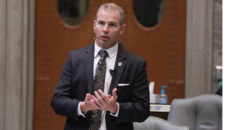Jefferson City, Mo. — On Aug. 9, Missouri Secretary of State Jay Ashcroft issued a certificate of sufficiency to initiative petition 2022-059, a petition that will place the legalization of marijuana and the expungement of non-violent cannabis offenses on November’s ballot.
For cannabis advocates in Missouri, the petition making it in front of Missouri voters is the culmination of a process over a decade in the making.
Gridlocked in the Senate
As is the case in many states, the process of getting cannabis legalization on the ballot started with medicinal marijuana. Starting with former Rep. Kate Meiners’ filing of House Bill 277 in 2009, state legislators repeatedly tried to file and push medicinal marijuana bills through the House and Senate.
Progress was made in 2014, when Senate Bill 951, filed by former Sen. Jason Holsman, made it to a hearing in the General Laws Committee. The bill passed through the committee but was never voted upon on the floor.
Despite the encouraging progress, cannabis advocates later realized that medicinal marijuana wasn’t going to advance in the Senate, being blocked by several Republican legislators.
In 2018, Holsman attempted to add an amendment setting rules for medicinal marijuana to a bill regarding opioid prescription and lowering the age required to get certain vaccines. He was met with stark opposition.
Sen. Bob Onder, R-St. Charles County, immediately opposed the amendment in ’18, the Springfield News-Leader reported. Onder raised concerns about children ending up in hospitals with marijuana poisoning and accused Holsman of trying to “hijack a pharmaceutical bill.” No marijuana overdoses have ever been reported, according to a 2020 report by the DEA.
Later that year, Missouri voters passed medicinal marijuana after it made it onto the ballot via another initiative petition, with over 60% of voters voting yes.
“A long, arduous process”
Medicinal marijuana passing in 2018 was a big win for cannabis advocates all over the Show Me State. However, the path to full-blown legalization was not as easy as some might think.
“Things were going smoothly up until the pandemic,” John Payne, campaign manager of cannabis group Legal Missouri 2022 and co-author of 2018’s medicinal marijuana amendment said. “This was a long, arduous process.”
In order to get legal marijuana on the ballot, Legal Missouri 2022 and its volunteers needed signatures, which became significantly harder to get when the entire country went on lock-down. COVID-19-related setbacks aside, Payne thinks the delay in getting signatures had some positive impacts.
“I think there was a silver lining to all this,” Payne said. “I think we have made an improved version of this amendment.”
Those improvements include multiple protections for medicinal marijuana use, including protecting employees from termination if they use medical marijuana off-the-clock, as well as protecting parents who use medicinal marijuana. The system for medical cards was also improved, as they would last three years instead of one, but still cost $25, if the amendment passes in November.
The passing of marijuana legalization, which will be on the ballot as Amendment Three, would also provide the expungement of non-violent marijuana-related criminal records.
Still, even with an improved amendment and a history of support for cannabis reform, Legal Missouri 2022 needed signatures.
In Missouri, those seeking to get an amendment on the ballot through an initiative petition need a number of signatures in at least six of Missouri’s eight congressional districts that must equal at least 8% of the total votes cast in each district in the most recent election for Governor.
Amendment Three missed the mark in Congressional Districts four and eight, and got through on razor-thin margins in Congressional Districts six and seven.
Going into the final days of gathering signatures, Payne knew he and his volunteers needed to focus on Congressional Districts six and seven.
Payne remembers fondly the mass mobilization of volunteers to Springfield, Mo. the biggest population center in Congressional District seven in the waning days of signature collection.
“I remember driving through and seeing petitioners everywhere,” Payne said. “We have a bunch of people really committed to this.”
Legal Missouri 2022 turned in its initiative petition on the very last day, May 8, with enough signatures to get on the ballot. Payne seems bullish about Amendment Three’s chances come November.
“Other, non-liberal states have passed this (cannabis legalization),” Payne said. “This is an issue that voters support.”
“They’re not afraid anymore”
Amendment Three made it onto the ballot on the backs of volunteers. The mobilization of a large number of volunteers to garner signatures for the cause ultimately ended in a successful effort.
“It’s what the people want!” Paula Prentice, a volunteer with Legal Missouri 2022 and a board member for NORML KC, a non-profit cannabis reform group, said. “People were happy, happy to sign, happy to get medical options.”
Prentice’s grandson has autism, and her husband suffers from a spinal condition. She believes that the option to consume marijuana to relieve pain is a choice every Missourian deserves to be able to make.
“I’m doing this for everybody,” Prentice said of her cannabis advocacy. “Medical (marijuana) has opened up so many people’s eyes to what cannabis can do for you.”
Prentice is most excited about the improvements to the medicinal marijuana program entailed in Amendment Three. Her experience out knocking doors has led her to believe that medical marijuana has helped remove the stigma around cannabis and those who consume it.
“They’re not afraid anymore,” Prentice said. “They’re not saying ‘Oh — it’s just somebody wanting to get stoned’ … the fog is lifting there.”
Prentice pointed to the volunteers and Payne as a real bright spot of the campaign. Volunteers focused on talking to prospective petition supporters at their level, an approach she thinks became a real strength of Legal Missouri 2022 and its efforts.
“We just have a wonderful team,” she said. “I would do it again, no question.”
As voters wait for the general election in November, Payne and his volunteer team feel good about Amendment Three’s chances, but aren’t planning to get complacent after the long journey to get to this point.
“Medical marijuana passed with 66% of the vote,” Payne said. “That doesn’t mean we don’t have work to do.”
“I’m sure we’ll be out there soon enough,” Prentice said.
To read the full text of Amendment Three on the Secretary of State’s website, click here.
Featured Image Courtesy of Legal Missouri 2022.



























